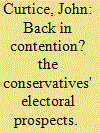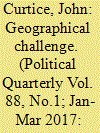| Srl | Item |
| 1 |
ID:
092362


|
|
|
|
|
| Publication |
2009.
|
| Summary/Abstract |
This article assesses whether the Conservatives are likely to be serious contenders for power at the next British general election. First it assesses how well the party will have to do to 'win' the election. Second, it considers whether the record of the polls since 2005 suggests the party is capable of securing the necessary support. Third, the article assesses whether the ideological mood of the electorate has moved closer to the Conservatives since 2005. Finally it considers whether the image of the party has improved.
The Conservatives are likely to have to outpoll Labour by a considerable margin to become the largest party but their record in opinion polls suggests they could achieve this. The ideological mood of the electorate has moved closer to the party, while David Cameron is a relatively popular leader. But the party has still not fully restored its reputation for economic competence.
|
|
|
|
|
|
|
|
|
|
|
|
|
|
|
|
| 2 |
ID:
152549


|
|
|
|
|
| Summary/Abstract |
Labour won fewer seats in 2015 than in 2010, even though its share of the vote increased. The decline in representation was occasioned by three features of the electoral geography of the 2015 contest—a collapse in Labour support in Scotland, a particularly strong Conservative advance in marginal seats and the fact that in England and Wales Labour's vote rose most strongly in seats that the party already held. As a result, Labour's vote became markedly less efficiently distributed than that of the Conservatives—a development that could make it very difficult for the party to win an overall majority at the next election. Meanwhile, the redrawing of constituency boundaries that is currently in train will make winning a majority even more difficult. However, the next election could well produce a hung parliament, and the party should be prepared for that eventuality.
|
|
|
|
|
|
|
|
|
|
|
|
|
|
|
|
| 3 |
ID:
145558


|
|
|
|
|
| Summary/Abstract |
Previous research has suggested that attitudes towards the European Union (EU) are shaped by two sets of considerations—economic and cultural. Using data from the 2015 British Social Attitudes survey, this article assesses which matters more in shaping attitudes in Britain towards the EU as the country prepares to vote in a referendum on whether it should remain in or leave the European Union. It shows that while concern about the cultural consequences of EU membership is widespread, voters are inclined to think that membership is economically beneficial. This cultural concern underpins a widespread scepticism about Europe, but voters are only likely to want to leave the EU if they are also convinced of the economic case for doing so.
|
|
|
|
|
|
|
|
|
|
|
|
|
|
|
|